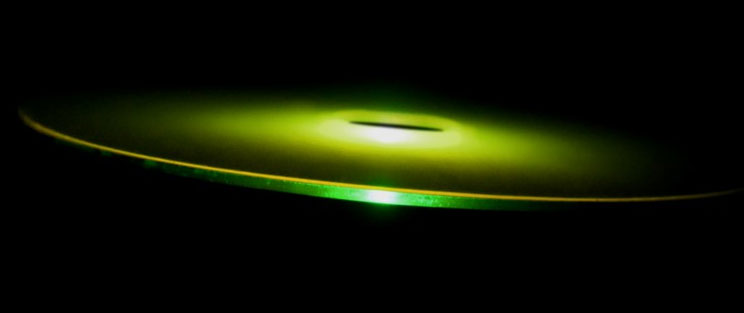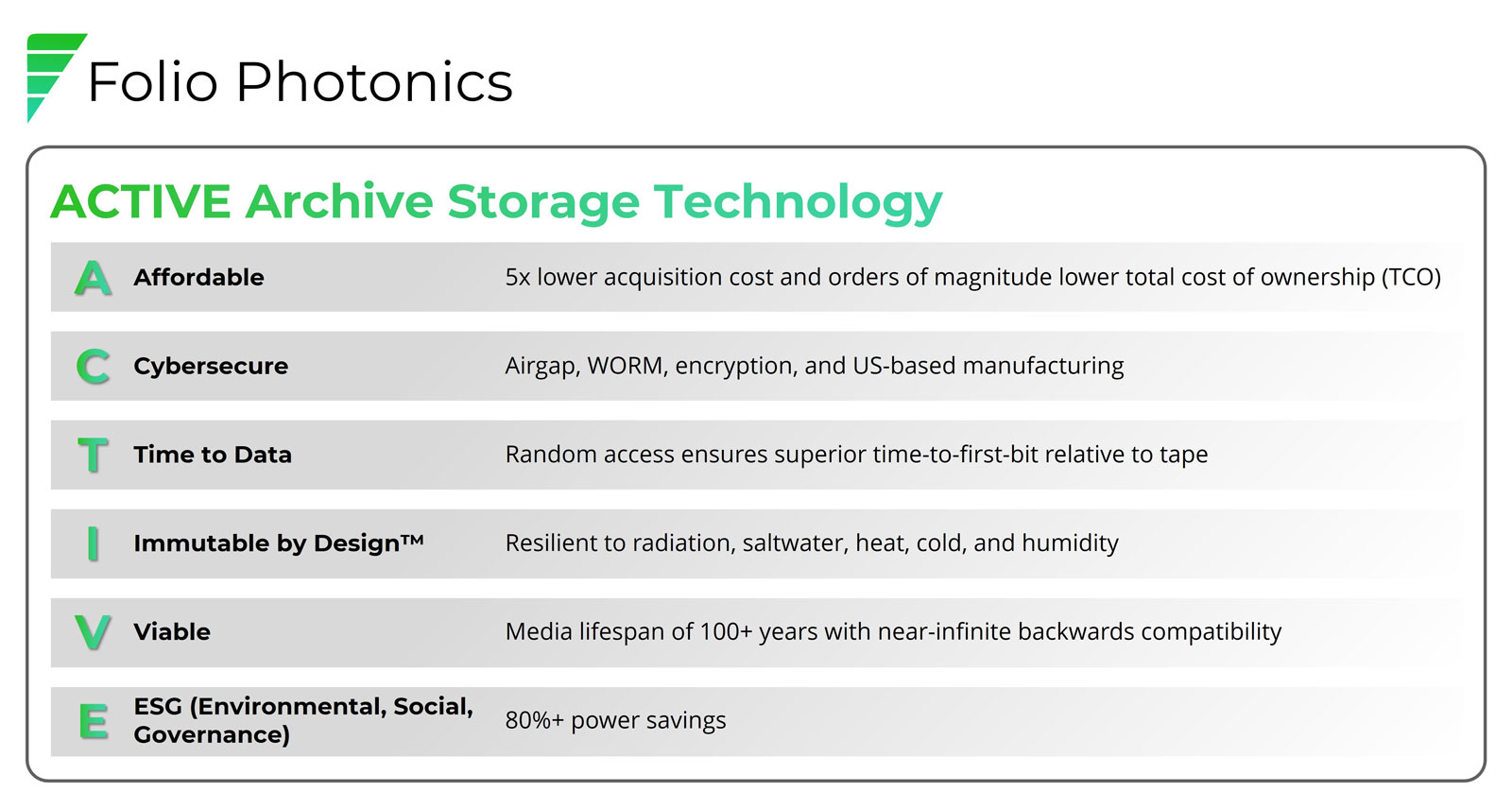Optical Discs at $5 per TB? Folio Photonics Attempts a New Spin
Claimed to use 80% less power than HDDs.
Get Tom's Hardware's best news and in-depth reviews, straight to your inbox.
You are now subscribed
Your newsletter sign-up was successful
Ohio-based Folio Photonics has announced its new Active (stylized "ACTIVE") read/write optical disk format. The new discs are claimed to hold 1TB each, and are expected to be packaged in 10-disc caddies. A particular highlight of these optical discs is that they can be produced at a "radical low-cost." Thanks to the use of next-gen materials and efficient production tech, ACTIVE discs cost less than $5 per TB, with a roadmap to $1 per TB.
Despite many people consigning ODD technology into the dustbin of tech history, alongside floppy disks and suchlike, Folio Photonics sounds extremely confident in its new format. Folio Photonics CEO, Steven Santamaria, boasted in a press release that the new ACTIVE discs offer "a fresh approach to optical storage that overcomes historical constraints and puts unheard of cost, cybersecurity and sustainability benefits within reach."
Santamaria’s claims were supported by seasoned IT industry analyst John Monroe, who praised the new optical format and provided some insight regarding the tech behind Active optical discs. While archival discs today employ three layers at the most, Active discs are created with next-gen materials, patented polymer extrusion, and film-based disc construction processes, explained Monroe. The discs work in concert with customized optical pickup units which together facilitate discs with up to 16 film layers per side. Furthermore, Folio Photonics has roadmaps with additional layers added over time, and media costs getting as low as $1 per TB.
Rollout of Active disc technology is expected to begin in 2024, with the 10-disc caddies supporting 10TB. The projected cost of $5 per TB is roughly 5x cheaper than HDD. Continuing with this comparison, HDDs consume up to 80% more power. Thus on two important counts (price per TB and running costs) Active is a clear leader compared to HDD storage. This TCO win should be attractive to enterprises interested in easy access archives.

Folio Photonics claims that the Active discs are created from sustainable materials. Nevertheless, there appears to be little compromise when it comes to the discs' durability as the media is claimed to have a 100 year lifespan, isn't affected by radiation or water, and is resilient to heat, cold and humidity.
The company additionally claims that the Active discs aren't vulnerable to EMP attacks, though HDDs are. Both Active and HDDs are superior to tape archive storage for fast read/write operations. The lack of any claims about the read/write performance of ACTIVE optical discs are conspicuous by their absence. Hopefully some performance details will be showcased ahead of product rollout.
Get Tom's Hardware's best news and in-depth reviews, straight to your inbox.

Mark Tyson is a news editor at Tom's Hardware. He enjoys covering the full breadth of PC tech; from business and semiconductor design to products approaching the edge of reason.
-
lmcnabney No mention of read / write speeds. Writing a TB to magnetic media takes a while. How long to write to these disks? Hours? Days?Reply -
King_V Definitely interesting, though. I'm glad to hear of the 100 year lifespan for the discs, as I've experienced at least one audio CD that suffered from disc rot. And, it spent the majority of its time in its case, in a holder.Reply -
mikeebb Yes, interesting, but: 1) speed, as questioned above and in the article? 2) longevity, based on what data? 3) disks sound great, but where's the drive? Certainly won't work in the DVD drive I have in the computer now, or even the BD writer I can plug into USB. On the plus side, if the drive can be backward compatible all the way to CD, and write them too, I could replace the DVD writer in the desktop with it. Again, interesting, but more info needed.Reply -
escksu Replylmcnabney said:No mention of read / write speeds. Writing a TB to magnetic media takes a while. How long to write to these disks? Hours? Days?
No idea but don't think it matters.
I can already forsee companies buying them for long term archival purpose. This is why I said time taken to write is't important. A full backup of a huge multi-terabyte server can take 24hrs or more. Its usually executed only on weekends so it doesn't matter. Nobody will be watching and waiting for it to complete. Start on Friday night or Saturday morning and check again on Monday.
Speed wise, blu-ray 1x is around 4.5MB/s, fastest todat is around 10-14x (45-63MB/s).
For DVD- 1x is around 1.3MB/s, fastest is 24x around 31MB/s.
So, even if we take it as a paltry 20MB/s, the drive can still write 1 TB in 14hrs, not too shabby. IF it can hit 50MB/s, thats around 5 1/2hrs. Looks very good. Btw, its WORM so you can't use it for regular backup. Only for archive.
Btw, such speeds are ok for corporate use because backup is mostly done through the network. Not all companies have 10Gbps network links.
Now, the main issue with be cost of the drives. -
kjfatl WORM would actually be very good for regular backups. Start with a full backup and then follow it up with incremental backups which are typically a small fraction of the total amount stored.Reply -
LuxZg As people already said - cost and availability of DRIVES is what's missing. Will it be 10k$ like tapes, 500$ like Blueray, 25$ like CD/DVD?Reply
I gave up on optical media due to data size, write speeds, and lack of durability. But a 10-TB cradle for 50$ would be good pick for personal archival. But HDDs are 20$/TB. So if drive is 500$ you need to write tons of data. For personal use I'd say anything over 200$ is dead on arrival, and it would need to be under 150$ to actually make notable impact.
For companies they'll need a "jukebox" type of rack-mount disk library with FC and 25GbE options AND integration with popular backup software. Then they can charge 10-15k for device. But tapes are large, cheap, and heavily established... Will be hard to overthrow. Specially because most companies practice disk + tape backups so random access isn't big concern. Tape is mostly for archival and to satisfy regulatory requirements. -
Sarreq Teryx And how much do/will the drives cost? I've wanted to get and LTO drive for a while, but don't have several thousand dollars to buy one.Reply
